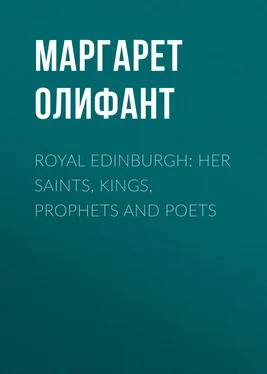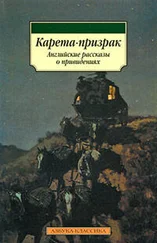Маргарет Олифант - Royal Edinburgh - Her Saints, Kings, Prophets and Poets
Здесь есть возможность читать онлайн «Маргарет Олифант - Royal Edinburgh - Her Saints, Kings, Prophets and Poets» — ознакомительный отрывок электронной книги совершенно бесплатно, а после прочтения отрывка купить полную версию. В некоторых случаях можно слушать аудио, скачать через торрент в формате fb2 и присутствует краткое содержание. Жанр: foreign_prose, История, literature_19, foreign_edu, foreign_antique, на английском языке. Описание произведения, (предисловие) а так же отзывы посетителей доступны на портале библиотеки ЛибКат.
- Название:Royal Edinburgh: Her Saints, Kings, Prophets and Poets
- Автор:
- Жанр:
- Год:неизвестен
- ISBN:нет данных
- Рейтинг книги:4 / 5. Голосов: 1
-
Избранное:Добавить в избранное
- Отзывы:
-
Ваша оценка:
- 80
- 1
- 2
- 3
- 4
- 5
Royal Edinburgh: Her Saints, Kings, Prophets and Poets: краткое содержание, описание и аннотация
Предлагаем к чтению аннотацию, описание, краткое содержание или предисловие (зависит от того, что написал сам автор книги «Royal Edinburgh: Her Saints, Kings, Prophets and Poets»). Если вы не нашли необходимую информацию о книге — напишите в комментариях, мы постараемся отыскать её.
Royal Edinburgh: Her Saints, Kings, Prophets and Poets — читать онлайн ознакомительный отрывок
Ниже представлен текст книги, разбитый по страницам. Система сохранения места последней прочитанной страницы, позволяет с удобством читать онлайн бесплатно книгу «Royal Edinburgh: Her Saints, Kings, Prophets and Poets», без необходимости каждый раз заново искать на чём Вы остановились. Поставьте закладку, и сможете в любой момент перейти на страницу, на которой закончили чтение.
Интервал:
Закладка:
This happened in 1443, when James was but thirteen. It would be as easy to say that Douglas displaced with a rush the two more successful governors of the kingdom, and took their places by storm—and perhaps it would be equally true: yet it would be vain to ignore James as an actor in national affairs because of his extreme youth. In an age when a boy of sixteen leads armies and quells insurrections, a boy of thirteen, trained amid all the exciting circumstances which surrounded James Stewart, might well have made a definite choice and acted with full royal intention, perhaps not strong enough to be carried out by its own impulse, yet giving a real sanction and force to the power which an elder and stronger man was in a position to wield. We have no such means of forming an idea of the character and personality of the second James as we have of his father. No voice of his sounds in immortal accents to commemorate his loves or his sadness. He appears first passively in the hands of conspirators who played him in his childhood one against the other, a poor little royal pawn in the big game which was so bloody and so tortuous. His young memory must have been full of scares and of guileful expedients, each party and individual about him trying to circumvent the other. Never was child brought up among wilder chances. The bewildering horror of his father's death, the sudden melancholy coronation, and all the nobles in their sounding steel kneeling at his baby feet, which would be followed in his experience by no expansion or indulgence, but by the confinement of the castle; the terrible loneliness of an imprisoned child, broken after a while by the sudden appearance of his mother, and that merry but alarming jest of his conveyance in the great chest, half stifled in the folds of her embroideries and cloth of gold. Then another flight, and renewed stately confinement among his old surroundings, monotony broken by sudden excitements and the babble in his ears of uncomprehended politics, from which, however, his mind, sharpened by the royal sense that these mysterious affairs were really his own, would no doubt come to find meaning at a far earlier age than could be possible under other circumstances. And then that terrible scene, most appalling of all, when he had to look on and see the two lads, not so much older than himself, young gallants, so brave and fine, to whom the boy's heart would draw in spite of all he might have heard against them, so much nearer to himself than either governor or chancellor, those two noble Douglases, suddenly changed under his eyes from gay and welcome guests to horrified victims, with all the tragic passion of the betrayed and lost in their young eyes. Such a scene above all must have done much to mature the intelligence of a boy full like all his race of spirit and independence, and compelled to look on at so much which he could not stop or remedy. Thus passive and helpless, yet with the fiction of supremacy in his name, we see the boy only by glimpses through the tumultuous crowd about him with all their struggles for power, until suddenly he flashes forth into the foreground, the chief figure in a scene more violent and terrible still than any that had preceded it, taking up in his own person the perpetual and unending struggle, and striking for himself the decisive blow. There is no act so well known in James's life as that of the second Douglas murder, which gives a sinister repetition, always doubly impressive, to the previous tragedy. And yet between the two what fluctuations of feeling, what changes of policy, how many long exasperations, ineffectual pardons, convictions unwillingly formed, must have been gone through. That he was both just and gentle we have every possible proof, not only from the unanimous consent of the chronicles, but from the manner in which, over and over again, he forgives and condones the oft-repeated offences of his friend. And there could be few more interesting psychological studies than to trace how, from the sentiments of love and admiration he once entertained for Douglas, he was wrought to such indignation and wrath as to yield to the weird fascination of that precedent which must have been so burnt in upon his childish memory, and to repeat the tragedy which within the recollection of all men had marked the Castle of Edinburgh with so unfavourable a stain.
We are still far from that, however, in the bright days when Douglas was Lieutenant-Governor of the kingdom, and the men who had murdered his kinsmen were making what struggle they could against his enmity, which pursued them to the destruction of one family and the frequent hurt and injury of the other. How Livingstone and his household escaped from time to time but were finally brought to ruin, how Crichton wriggled back into favour after every overthrow, sometimes besieged in his castle for months together, sometimes entrusted with the highest and most honourable missions, it would be vain to tell in detail. James would seem to have yielded to the inspiration of his new prime minister for a period of years, until his mind had fully developed, and he became conscious, as his father had been, of the dangers which arose to the common weal from the lawless sway of the great nobles, their continual feuds among themselves, and the reckless independence of each great man's following, whose only care was to please their lord, with little regard either for the King and Parliament or the laws they made. During this period his mother died, though there is little reason to suppose that she had any power or influence in his council, or that her loss was material to him. She had married a second time, another James Stewart called the Black Knight of Lorne, and had taken a considerable part in the political struggles of the time always with a little surrounding of her own, and a natural hope in every change that it might bring her son back to her. It is grievous that with so fair a beginning, in all the glow of poetry and love, this lady should have dropped into the position of a foiled conspirator, undergoing even the indignity of imprisonment at the hands of the Regents whom she sometimes aided and sometimes crossed in their arrangements. But a royal widow fallen from her high estate, a queen-mother whose influence was feared and discouraged and every attempt at interference sternly repressed, would need to have been of a more powerful character than appears in any of her actions to make head against her antagonists. She died in Dunbar in 1446, of grief, it is said, for the death of her husband, who had been banished from the kingdom in consequence of some hasty words against the power of the Douglas, of whom however, even while he was still in disgrace, Sir James Stewart had been a supporter. Thus ended in grief and humiliation the life which first came into sight of the world in the garden of the great donjon at Windsor some quarter of a century before, amid all the splendour of English wealth and greatness, and all the sweet surroundings of an English May.
James was married in 1450, when he had attained his twentieth year, to Mary of Gueldres, about whom during her married life the historians find nothing to say except that the King awarded pardon to various delinquents at the request of the Queen—an entirely appropriate and becoming office. No doubt his marriage, so distinct as a mark of maturity and independence, did something towards emancipating James from the Douglas influence; and it is quite probable that the selection of Sir William Crichton to negotiate the marriage and bring home the bride may indicate a lessening supremacy of favour towards Douglas in the mind of his young sovereign. Pitscottie records a speech made to the Earl and his brothers by the King, when he received and feasted them after their return from a successful passage of arms with the English on the Border, in which James points out the advantage of a settled rule and lawful authority, and impresses upon them the necessity of punishing robbers and reivers among their own followers, and seeing justice done to the poor, as well as distinguishing themselves by feats of war. By this time the Douglases had once more become a most formidable faction. The head of the house had so successfully worked for his family that he was on many occasions surrounded by a band of earls and barons of his own blood, his brothers having in succession, by means of rich marriages or other means of aggrandisement, attained the same rank as himself, and, though not invariably, acting as his lieutenants and supporters, while his faction was indefinitely increased by the followers of these cadets of his house, all of them now important personages in the kingdom. It was perhaps the swelling pride and exaltation of a man who had all Scotland at his command, and felt himself to have reached the very pinnacle of greatness, which suggested the singular expedition to France and Rome upon which Douglas set forth, in the mere wantonness of ostentation and pride, according to the opinion of all the chroniclers, to spread his own fame throughout the world, and show the noble train and bravery of every kind with which a Scottish lord could travel. It was an incautious step for such a man to take, leaving behind him so many enemies; but he would seem to have been too confident in his own power over the King, and in his greatness and good fortune, to fear anything. No sooner was he gone, however, than all the pent-up grievances, the complaints of years during which he had wielded almost supreme power in Scotland, burst forth. The King, left for the first time to himself and to the many directors who were glad to school him upon this subject, was startled out of his youthful ease by the tale of wrong and oppression which was set before him. No doubt Sir William Crichton would not be far from James's ear, nor the representatives of his colleague, whom Douglas had pursued to the death. The state of affairs disclosed was so alarming that John Douglas, Lord Balvenie, the brother of the Earl, who was left his procurator and representative in his absence, was hastily summoned to Court to answer for his chief. Balvenie, very unwilling to risk any inquisition, held back, until he was seized and brought before the King. His explanations were so little satisfactory, that he was ordered at once to put order in the matter, and to "restore to every man his own:" a command which he received respectfully, but as soon as he got free ignored altogether, keeping fast hold of the ill-gotten possessions, and hoping, no doubt, that the momentary indignation would blow over, and all go on as before. James, however, was too much roused to be trifled with. When he saw that no effect was given to his orders he took the matter into his own hands. The Earl of Orkney with a small following was first sent with the King's commission to do justice and redress wrongs: but when James found his ambassador insulted and repulsed, he took the field himself, first making proclamation to all the retainers of the Douglas to yield to authority on pain of being declared rebels. Arrived in Galloway, he rode through the whole district, seizing all the fortified places, the narrow peel-houses of the Border, every nest of robbers that lay in his way, and, according to one account, razed to the ground the Castle of Douglas itself, and placed a garrison of royal troops in that of Lochmaben, the two chief strongholds of the house. But James's mission was not only to destroy but to restore. He divided the lands thus taken from the House of Douglas, according to Pitscottie, "among their creditors and complainers, till they were satisfied of all things taen from them, whereof the misdoers were convict." This, however, must only have applied, one would suppose, to the small losses of the populace, the lifted cows and harried lands of one small proprietor and another. "The King," adds the same authority, "notwithstanding of this rebellion, was not the more cruel in punishing thereof nor he was at the beginning:" while Buchanan tells us that his clemency and moderation were applauded even by his enemies.
Читать дальшеИнтервал:
Закладка:
Похожие книги на «Royal Edinburgh: Her Saints, Kings, Prophets and Poets»
Представляем Вашему вниманию похожие книги на «Royal Edinburgh: Her Saints, Kings, Prophets and Poets» списком для выбора. Мы отобрали схожую по названию и смыслу литературу в надежде предоставить читателям больше вариантов отыскать новые, интересные, ещё непрочитанные произведения.
Обсуждение, отзывы о книге «Royal Edinburgh: Her Saints, Kings, Prophets and Poets» и просто собственные мнения читателей. Оставьте ваши комментарии, напишите, что Вы думаете о произведении, его смысле или главных героях. Укажите что конкретно понравилось, а что нет, и почему Вы так считаете.












